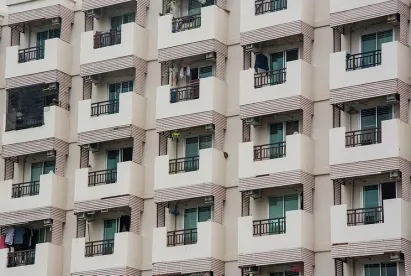City of Los Angeles apartment owners recently lost their bid in Federal Court to halt the application of Mayor Eric Garcetti’s eviction moratorium[1] and rent freeze ordinance[2] (the “City Moratorium”). Senior United States District Judge Dean D. Pregerson ruled on November 13, 2020 that the apartment owners had failed to show “irreparable harm” because (a) there was no immediate threat of foreclosure, and (b) the City Moratorium appeared to be “imminently reasonable” in the context of the unprecedented pandemic.[3]
The Apartment Association of Greater Los Angeles (“AAGLA”), an organization of thousands of owners and managers of rental housing units, had argued that the City Moratorium violates their rights under the Contract and Due Process Clauses of the United States Constitution. Specifically, the owners argued that the City Moratorium deprived them of their rights to enforce their remedies under the terms of their rental agreements without giving them the right to present arguments in a fair legal process.
In issuing his ruling, Judge Pregerson acknowledged the legitimacy of the landlords’ concerns, but expressed his opinion that “courts are an imperfect tool to resolve such conflicts”, as are laws and ordinances that “shift economic burdens from one group to another”. He went on to state that the current situation is a “war in every real sense”, “pitting hundreds of thousands of tenants against tens of thousands of landlords”, but concluded that lawmakers and not the courts should “lead us to a speedy and fair solution”.
The Court’s reasoning was based in large part on the conclusion that despite the City Moratorium preventing eviction, landlords are not deprived of their right to sue for unpaid rent, and further found that the injury to the landlords can be remedied with money damages. The Court also placed great importance on the societal need to protect vulnerable tenants in a “state of emergency”[4].
It remains to be seen what will transpire in future stages of this case and other cases like it across the country, as landlords are likely to argue that they suffered a taking without due process or just compensation, and that they have suffered an unfair burden when compared with many other essential businesses and services that have not been forced to provide their goods and services free of charge. As a result, many landlords remain hopeful that legislative action will be taken, at the federal, state and local levels, to provide relief in the form of grants, vouchers or tax credits that allow them to recoup some portion of their losses.
FOOTNOTES
[1] City of Los Angeles Ordinance No. 186606, which prohibits residential evictions for 12 months following the end of the COVID emergency.
[2] City of Los Angeles Ordinance No. 186607, which prohibits rent increases on units subject to existing rent control provisions for 12 months following the end of the COVID emergency.
[3] Apartment Association of Los Angeles County, Inc. v. City of Los Angeles, Case No. CV 20-05193 (C.D. Cal. 2020).
[4] California legislature recently passed AB 3088 in August 2020, which also prohibits evictions for non-payment of rent due to COVID-19, without limiting landlords’ ability to seek money damages for unpaid rent. The state law does not affect pre-existing local ordinances except to (1) trigger the commencement of any existing local rent payment grace periods to March 1, 2021 and (2) terminate any such repayment periods on March 31, 2022.



 />i
/>i

